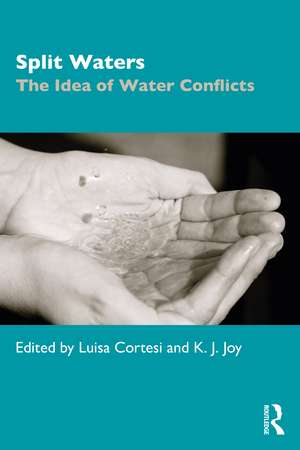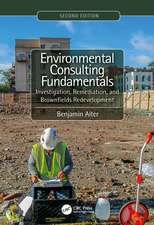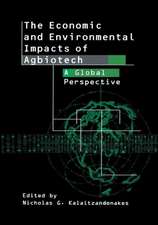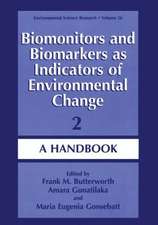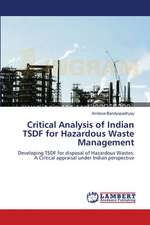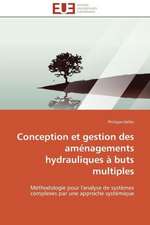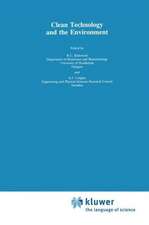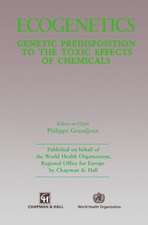Split Waters: The Idea of Water Conflicts
Editat de Luisa Cortesi, K. J. Joyen Limba Engleză Paperback – 6 iul 2021
This commonsensical narration of water conflicts, however, follows a pattern of scarcity and necessity that is remarkably unvaried despite different social and geographical contexts.
Through in-depth case studies from around the globe, this volume investigates this similarity of narration—confronting the power of a single story by taking it seriously instead of dismissing it. In so doing, it invites the reader to rethink water conflicts and how they are commonly understood and managed.
This book:
- Posits the existence of the idea of water conflict, and asks what it is and what it produces, thus how it is used to pursue particular interests and to legitimise specific historical, technological and environmental relations;
- Examines the meaning and power of ideas as compared to other categories of knowledge, advancing theoretical frameworks related to environmental knowledge, discursive power, social constructivism;
- Presents an alternative agenda to deepen the conversation around water conflicts among scholars and activists.
Essays by Gina Bloodworth, Ben Bowles, Patrick Bresnihan, Luisa Cortesi, Mattia Grandi, K. J. Joy, Midori Kawabe, Adrianne Kroepsch, Vera Lazzaretti, Leslie Mabon, Renata Moreno Quintero, Madhu Ramnath, Jayaprakash Rao Polsani, Dik Roth, Theresa Selfa,Veronica Strang, Mieke van Hemert, Jeroen Warner, Madelinde Winnubst.
| Toate formatele și edițiile | Preț | Express |
|---|---|---|
| Paperback (1) | 354.93 lei 6-8 săpt. | |
| Taylor & Francis – 6 iul 2021 | 354.93 lei 6-8 săpt. | |
| Hardback (1) | 1054.71 lei 6-8 săpt. | |
| Taylor & Francis – 6 iul 2021 | 1054.71 lei 6-8 săpt. |
Preț: 354.93 lei
Nou
Puncte Express: 532
Preț estimativ în valută:
67.92€ • 70.48$ • 56.77£
67.92€ • 70.48$ • 56.77£
Carte tipărită la comandă
Livrare economică 15-29 martie
Preluare comenzi: 021 569.72.76
Specificații
ISBN-13: 9780367466428
ISBN-10: 0367466422
Pagini: 276
Ilustrații: 32
Dimensiuni: 156 x 234 x 15 mm
Greutate: 0.42 kg
Ediția:1
Editura: Taylor & Francis
Colecția Routledge India
Locul publicării:Oxford, United Kingdom
ISBN-10: 0367466422
Pagini: 276
Ilustrații: 32
Dimensiuni: 156 x 234 x 15 mm
Greutate: 0.42 kg
Ediția:1
Editura: Taylor & Francis
Colecția Routledge India
Locul publicării:Oxford, United Kingdom
Public țintă
Postgraduate and ProfessionalCuprins
Foreword: Under The Surface Of Water Conflicts Veronica Strang. Introduction: Water Conflicts: The Social Life Of An Idea Luisa Cortesi Part III: Agential Purchase Of The Idea 1. Can’t Trust: The Boaters Of The Waterways Of South East England Versus ‘The Charity That Makes You Homeless Ben Bowles 2. Fighting Against Harmful Rumours, Or For Fisheries? Evaluating Framings And Narrations Of Risk Governance In Marine Radiation After The Fukushima Nuclear Accident Leslie Mabon And Midori Kawabe 3. Room For The River, No Room For Conflict: Narratives Of Participation, Win-Win, Consensus, And Co-Creation In Dutch Spatial Flood Risk Management Dik Roth, Jeroen Warner And Madelinde Winnubst Part II: Instrumentalization Of The Idea Of Water Conflict 4. Tocks Island And The End Of The Big Dam Era In The USA Gina Bloodworth 5. When Oil Meets Water: Debating The Hydraulic Fracturing Energy–Water Nexus In Colorado Adrianne Kroepsch 6. Water And Conflicts Around Religious Heritage: Oscillations Between Centre And Periphery? Vera Lazzaretti Part III: Naturalization Of Ecological, Technological, Historical Relations 7. Taming The Cauca River: Community And Sugar Landowners’ Contrasting Narratives In Addressing Flood Risk In Valle Del Cauca, Colombia Renata Moreno-Quintero And Theresa Selfa 8 Images Of The Nile: How Competing Narratives Frame Water Disputes Mattia Grandi 9. Infrastructural Care And Water Politics In Cochabamba, Bolivia Patrick Bresnihan 10. The Negation Of Change As A Narrative Strategy Of Control: The Case Of The Polavaram Mega-Dam In India Mieke Van Hemert, Jayaprakesh Rao Polsani and Madhu Ramnath. Conclusion: Deepening the conversation around water conflicts K. J. Joy
Notă biografică
Luisa Cortesi is Assistant Professor, International Institute of Social Studies, Erasmus University, The Hague, The Netherlands; Marie S. Curie Fellow; Freiburg Institute of Advanced Studies Fellow, Freiburg University, Germany; Visiting Assistant Professor, Department of Natural Resources and the Environment, Cornell University, USA. She leads the Water Justice and Adaptation Lab.
K. J. Joy is Founding Member and Senior Fellow, Society for Promoting Participative Ecosystem Management (SOPPECOM), Pune, India; Convener, Forum for Policy Dialogue on Water Conflicts in India.
K. J. Joy is Founding Member and Senior Fellow, Society for Promoting Participative Ecosystem Management (SOPPECOM), Pune, India; Convener, Forum for Policy Dialogue on Water Conflicts in India.
Recenzii
Through case studies and theoretical analyses, this volume brings new value to the study of water conflict. Rather than an obstacle to cooperation, conflict becomes an invitation to explore more deeply the who, why and how of water policy decisions.
David Groenfeldt, Director, Water-Culture Institute, Santa Fe, New Mexico
The book demonstrates that as society makes and remakes the hydrosocial cycle, frictions occur, slowing down or hastening the flows of power through waters. It offers an invitation to reimagine water conflicts as those innumerable and minute abrasions that occur every day, but are often not recognised as ‘water conflicts’, a term which unfortunately remains globally associated with violent, large-scale acute disputes. This book will remain a milestone for academic researchers, scholars, practitioners, and activists involved in the ongoing reconceptualisation and reinterpretations of water and water conflicts.
Kuntala Lahiri-Dutt, Professor, Resource, Environment & Development Program, Crawford School of Public Policy, The Australian National University
This rich collection highlights conceptual and empirical issues for reconceptualisation of water conflicts, from an insightful introduction, to case studies from India to Bolivia. Moving away from notions of violence, incorporating notions of structural or slow violence, while also engaging contemporary issues such as the water–energy nexus, and conflicts related to the end of the big dam era, the authors have gifted us with a worthwhile and highly recommended contribution.
Leila M. Harris, Professor, Institute for Resources, Environment and Sustainability and Institute for Gender, Race, Sexuality and Social Justice, University of British Columbia
It is widely believed that people are willing to fight and die for water, and the notion of widespread water conflicts is a compelling one. By charting the social life of the idea of water conflicts, Spilt Waters powerfully urges us to re-examine simplistic notions of scarcity and environmental conflicts that can serve to legitimise certain interventions and interests, and also potentially engender more water conflicts. A must-read for scholars, activists and practitioners striving for water justice.
Lyla Mehta, Professor, Institute of Development Studies, UK and Norwegian University of Life Sciences
Split Waters is a fascinating collection of essays that shed new light on the enduring dramas of overt and covert water-based injustices and socio-territorial transformations. The authors’ critical, pluralist perspectives also illuminate how those affected by multi-dimensional water violence engage in socially and politically empowering action to construct dignified livelihoods. A must-read for students and scholars interested in the grounded understanding and cross-disciplinary theorisation of water conflicts, this book constitutes an essential reference.
Rutgerd Boelens, Professor, Water Governance & Social Justice, Wageningen University & Professor, Political Ecology of Water, CEDLA/University of Amsterdam
David Groenfeldt, Director, Water-Culture Institute, Santa Fe, New Mexico
The book demonstrates that as society makes and remakes the hydrosocial cycle, frictions occur, slowing down or hastening the flows of power through waters. It offers an invitation to reimagine water conflicts as those innumerable and minute abrasions that occur every day, but are often not recognised as ‘water conflicts’, a term which unfortunately remains globally associated with violent, large-scale acute disputes. This book will remain a milestone for academic researchers, scholars, practitioners, and activists involved in the ongoing reconceptualisation and reinterpretations of water and water conflicts.
Kuntala Lahiri-Dutt, Professor, Resource, Environment & Development Program, Crawford School of Public Policy, The Australian National University
This rich collection highlights conceptual and empirical issues for reconceptualisation of water conflicts, from an insightful introduction, to case studies from India to Bolivia. Moving away from notions of violence, incorporating notions of structural or slow violence, while also engaging contemporary issues such as the water–energy nexus, and conflicts related to the end of the big dam era, the authors have gifted us with a worthwhile and highly recommended contribution.
Leila M. Harris, Professor, Institute for Resources, Environment and Sustainability and Institute for Gender, Race, Sexuality and Social Justice, University of British Columbia
It is widely believed that people are willing to fight and die for water, and the notion of widespread water conflicts is a compelling one. By charting the social life of the idea of water conflicts, Spilt Waters powerfully urges us to re-examine simplistic notions of scarcity and environmental conflicts that can serve to legitimise certain interventions and interests, and also potentially engender more water conflicts. A must-read for scholars, activists and practitioners striving for water justice.
Lyla Mehta, Professor, Institute of Development Studies, UK and Norwegian University of Life Sciences
Split Waters is a fascinating collection of essays that shed new light on the enduring dramas of overt and covert water-based injustices and socio-territorial transformations. The authors’ critical, pluralist perspectives also illuminate how those affected by multi-dimensional water violence engage in socially and politically empowering action to construct dignified livelihoods. A must-read for students and scholars interested in the grounded understanding and cross-disciplinary theorisation of water conflicts, this book constitutes an essential reference.
Rutgerd Boelens, Professor, Water Governance & Social Justice, Wageningen University & Professor, Political Ecology of Water, CEDLA/University of Amsterdam
Descriere
Through in-depth case studies from around the globe, this volume investigates this similarity of narration in water conflicts —confronting the power of a single story by taking it seriously instead of dismissing it. In so doing, the book invites to rethink water conflicts and how they are commonly understood and managed.
